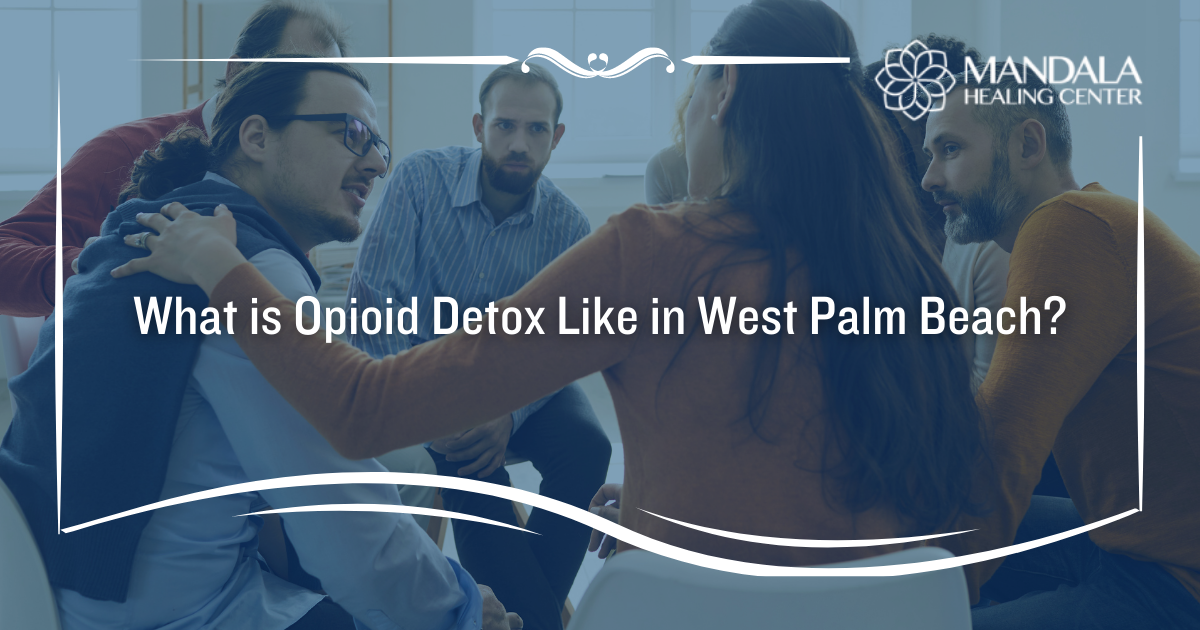According to the U.S. Department of Health and Human Services, “In 2019, an estimated 10.1 million people aged 12 or older misused opioids in the past year.”[1]
Opioid addiction is widespread, affecting millions of Americans every day. Individuals who struggle with opioid use disorder have become mentally and physically dependent on opioid drugs. As a result, abruptly ending one’s use of these substances will result in the emergence of withdrawal symptoms.
Oftentimes, withdrawal symptoms are highly uncomfortable with the potential to become life-threatening. Unfortunately, this causes individuals who attempt to detox at home to return to opioid abuse in hopes of soothing the withdrawal symptoms. Opioid detox centers in West Palm Beach provide people with the medical care and emotional support they need to overcome their withdrawal symptoms.
The Symptoms of Opioid Withdrawal
Withdrawal occurs when an individual who is dependent on a substance cuts down on their use or completely stops taking it. When an individual is addicted to opioids, they will experience symptoms of withdrawal upon the cessation of their use.
The early symptoms of opioid withdrawal include:
- Muscle aches and pains
- Restlessness, especially in the legs
- Teary eyes
- Excessive sweating
- Insomnia
- Frequent yawning
The later and more intense symptoms of withdrawal include:
- Abdominal cramps
- Diarrhea
- Goosebumps
- Nausea and vomiting
- Dilated pupils and blurry vision
- Rapid heartbeat
- Increased blood pressure
While opioid withdrawal symptoms are usually not life-threatening, coping with them can be difficult without medical assistance. Unfortunately, people who attempt to detox from opioids at home commonly end up relapsing to stop their symptoms from occurring. Sometimes this results in an accidental overdose, as their body is not used to the potent dosage the individual became accustomed to during their addiction.
What to Expect During Opioid Detox in West Palm Beach
The overall goal of an opioid detox program is to help individuals detox from opioids safely and comfortably. Additionally, medications and treatments will be provided to soothe severe symptoms of withdrawal and maintain the patient’s health throughout the process.
Medication-Assisted Detox
The symptoms of withdrawal can be treated with medications to ensure the patient feels comfortable.
For mild symptoms of muscle aches or pains, patients will be given anti-inflammatory drugs (NSAIDs) like Aspirin or Ibuprofen. Additionally, they will receive plenty of fluids, orally and through an IV as needed.
For symptoms of diarrhea, patients may be given an over-the-counter medication known as Immodium. Patients struggling with symptoms of nausea can receive hydroxyzine or Zofran.
Individuals who struggle with more severe symptoms of withdrawal may be provided with Clonidine. According to research, this medication can reduce the severity of withdrawal symptoms by 50 to 75%.[2]
Lastly, patients have the option to utilize medication-assisted detox treatments such as buprenorphine. This medication prevents the symptoms of withdrawal from occurring and stops the individual from experiencing cravings for opioids.
Monitoring of Vitals
Throughout opioid detox, medical staff will monitor each patient’s vital signs consistently. This includes ensuring that their pulse rate, respiratory rate, body temperature, and blood pressure are all at normal levels.
Symptoms of opioid withdrawal such as rapid heartbeat and increased blood pressure can become dangerous if left untreated. This is why the monitoring of vitals is extremely important to the detoxification process.
In addition to vital sign monitoring, patients will be assessed to determine if they are lacking any essential vitamins in their bodies. If so, they will undergo vitamin replacement therapy to ensure they have the nutrients they need to regain their health. According to research, having a deficiency in Vitamin D can increase an individual’s cravings for opioids.[3]
Mental Health Support
Oftentimes, opioid withdrawal causes extreme symptoms of depression, anxiety, and insomnia. Additionally, patients tend to have a hard time psychologically during the early stages of sobriety from any drug. This is because they no longer have access to their previous form of coping mechanism or self-medication.
Medical detox programs for opioid addiction provide their patients with 24/7 access to mental health support and counseling. Also, being in a facility surrounded by other patients who are going through similar challenges allows patients to make connections with their peers. This provides them with a sense of community and accountability to continue their recovery program.
Transitioning to Residential or Outpatient Treatment
Once an individual is considered medically clear to leave detox, their recovery journey is not yet finished. Typically, people recovering from severe opioid addictions will opt to attend a continuum of care. This includes detox, inpatient addiction treatment, a partial hospitalization program (PHP), an intensive outpatient program (IOP), and an outpatient treatment program (OP).
Reputable opioid detox centers in West Palm Beach provide their patients with referrals to residential addiction treatment programs or outpatient treatment facilities depending on the individual’s needs. Some detox programs include a continuum of care within the same facility, allowing patients to move on each phase of their recovery journey without having to relocate every time.
Attend a Top-Rated Opioid Detox Facility in West Palm Beach, FL
If you or a loved one suffer from opioid addiction, recovery is possible. While dealing with opioid withdrawal symptoms can be scary, detox facilities in West Palm Beach can help you manage them with ease.
At Mandala Healing Center, we offer medication-assisted detox treatments to provide our patients with the comfort and safety they deserve. Contact us today for more information on our drug and alcohol detox services in West Palm Beach, FL.
References:












